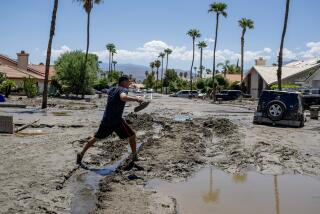A Roughneck on a Mercy Mission
- Share via
New Orleans — Thomas Sterling steered his skiff around the top of a submerged SUV and under a dangling power line, navigating his flooded 9th Ward neighborhood like a champion gondolier.
“Would you believe I’ve been up since 5 this morning paddling this boat?” Sterling asked.
Shirtless and tattooed, with one cigarette in his mouth and a spare on his ear, Sterling said he has been running a freelance maritime rescue operation since Hurricane Katrina sent water crashing through doors and windows.
“I ain’t never seen so many dead people, and I ain’t never saved so many people,” Sterling said. “I must have rescued over 200 people.”
As with much storytelling in New Orleans, it’s hard to know where truth tires out and imagination takes up the slack. But as we floated slowly through the ruined neighborhood, there was no denying the floating corpse that bobbed against the front of a faded blue duplex at 1728 Desire St.
It looked like a man. He was face-down, wearing a blue shirt, black pants and rubber boots. Sterling suspected he’d know him if he could see his face.
The former dockworker, 53, on disability with a nerve condition, had never given a thought to evacuating.
“I knew I would survive, so I wanted to stay here and help other people who wouldn’t leave or couldn’t get out,” said Sterling, whose chest tattoo says, “All Eyes on Me, Me Against the World.”
Sterling had obliged my request for a ride aboard the 12-foot SS 9th Ward -- as I christened it -- of which he came into possession after Katrina. He hadn’t bothered to mention before I got in that it leaked.
“Get that cup and empty some of that water,” Sterling ordered Bernard Sims, the other passenger.
Sims, who was taking food back to his stranded family, grabbed a plastic cup and began bailing 4 inches of standing water.
“It’s just got a little leak is all,” Capt. Sterling reassured us as we passed the St. Vincent de Paul Cemetery, where fetid brown water lapped at the base of above-ground crypts.
When Sterling snapped at Sims for not bailing or paddling fast enough, it became clear there were no free rides on this boat. To earn my keep, I picked up one of the fence boards he used as paddles, and Sterling immediately began coaching me.
“Just like that. There you go. This other crazy nut doesn’t know nothing,” said Sterling.
Despite his confidence in me, we were turned sideways and adrift as we entered an intersection just as an inflatable powerboat puttered by with uniformed officers.
“This isn’t safe,” one of the officers told Sterling, advising all of us to evacuate. “In two or three more days, this water is going to be really bad.”
It was already really bad, with floating debris fields and hot rising drafts of sewer smells. Rescue helicopters hovered overhead, dropping low to search for people still stranded a week after Katrina roared through.
Sterling waved off the officer’s warning and paddled on. His resolve to stay put grew stronger, he said, when it became apparent that it would take forever for rescuers to arrive on the east side of New Orleans despite televised images of trapped residents stranded on rooftops.
“It didn’t take but two days to get them troops to Iraq,” Sterling snarled as the water grew deeper, chocolaty muck rippling over the porches of clapboard houses, some with shingles blown off.
Sterling’s house has a river running through it, so he’s staying with about 20 other neighborhood residents on the dry second floor of an elementary school. He spends his days running supplies back to the school, taking people to check on their damaged houses and ferrying away residents who give up the fight and finally agree to be evacuated.
Some of them don’t make it out in time.
Across the street from the Vine Church of Christ and on a nearby porch, a stranded dog, one of many we saw on our voyage, looked at us with desperate eyes.
We dropped off Sims, who had opted against evacuating because his second-story apartment stayed dry, and because he didn’t know who would take him in with his terrier, Queenie. He lives above Winner’s Super Market at Desire and North Galvez.
Sterling and I paddled on, headed for the school with a large box of Bud’s Best gingersnaps and chocolate chip cookies that Sterling had scrounged at an abandoned and storm-battered warehouse.
“I don’t go for none of this looting going on,” he said. “But if it’s food and drinks for people left behind....”
We dodged tree limbs, the tops of cars, stop signs, clothing, furniture, sofa cushions and various unidentifiable floating objects. A panicked dog jumped off a porch, swam toward us, then reconsidered and struggled against a strong current as it tried to make it back to the porch.
Thomas said he’d heard about a boater held up at gunpoint and boatjacked. He hadn’t heard the rumor of an epidemic, though, and said that after a week of sloshing around out here, whatever happened, happened.
A block behind us, a helicopter hovered low in a hazy, hot sky and a man was lowered toward the drowned street to make a rescue. Another helicopter got a little too close to us and churned up the water, rocking our leaky aluminum skiff and sending it sideways toward a rooftop. Sterling grabbed a power line and held tight until the water and wind settled, and we were on our way again with our shipment of Bud’s Best cookies.
Some of Sterling’s roommates came to the window of the schoolhouse to see what he’d brought back this time, and someone complained that he hadn’t picked up any bread. A man named Harold Augustine emerged from the school to pick up the cookies. He told me he lived on Congress Street, and there was no way he was leaving town with his grandmother’s antiques stored in the attic of his flooded house.
“If someone tries to get them, they’ll have a fight with me,” Augustine said.
I suspected that Thomas Sterling stays behind for different reasons, some rational, and some attributable to battle fatigue.
The 9th Ward is underwater and maybe lost for good, but he’s got nowhere else to go, and he has people counting on him in the place he calls home.
Paddling back, his arms weary, he wondered where he could get some bread.
More to Read
Sign up for Essential California
The most important California stories and recommendations in your inbox every morning.
You may occasionally receive promotional content from the Los Angeles Times.














